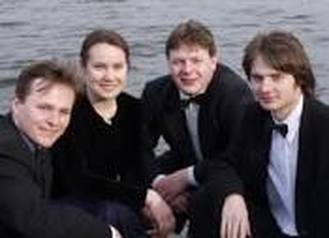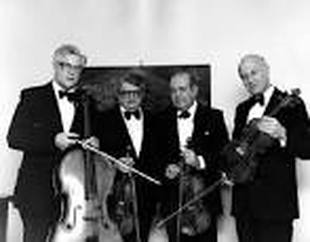A group of local investors managed to save it in the short term, but – failing to make a profit – sold it to the local Board of Health, and it has remained publicly owned ever since, lately under the control of Warwick District Council. In the 1990s, the Council proposed that it should become a private operation, and it took a concerted campaign by local people, with the help of luminaries such as Earl Spencer, Lady Diana’s father and a really nice guy, to thwart these Thatcherite plans and, instead, transform these famous buildings into a cultural complex, which incorporates a library, a museum, an art gallery, a tourist information centre, and the refurbished original assembly rooms. This last has an ambience and an acoustic which are particularly well-suited to chamber music and, in my view at least, has contributed immeasurably to the continuing success of Leamington’s International String Quartet series.
This is where I was on Friday evening to hear the Atrium String Quartet play a concert which included the first of Haydn’s Russian Quartets, Opus 33 No1, the second Prokofiev, Opus 92, and – in the second set – Beethoven’s quartet in A minor, Opus 132, perhaps the finest of Beethoven’s great, late quartets.
I am a huge fan of these four young Russians from Leningrad (or St Petersburg as I fail to learn to call it). Having seen them in Leamington, I have travelled to London for a couple of performances of Shostakovich in the Wigmore Hall; so I was looking forward to seeing them again at the Pump Rooms and hearing, especially, the Beethoven, which was written just 11 years after the building opened its doors.
Now, I was brought up on the Amadeus, who would usually extend this movement closer to 20 minutes. Which it should be – despite the faster moments of renewed health which punctuate it. So the Atrium’s version lacked that sublime gravitas to which I was accustomed. And it occurred to me, walking home in the rain, that this is to do with the age and maturity of the four players.
The A minor is about mortality. It was written whilst recovering from a life-threatening illness. The slow movement is dedicated to a god who had spared him. I am not sure that the youthful precocity of the Atrium is ready for the profound emotions which I find when listening to the Amadeus renditions.
This is not surprising, really. Would one wish to see Lear played by a 20 year old actor? One looks for the life experience and depths of pain and pleasure of a significantly older man.
So with Beethoven who, at this point, had less than two years to live.
There is no doubt that the performance was technically accomplished. It was played with spirit and power. But perhaps because I am now of a certain age, I look for more emotional resonance, more appreciation of the uncertainties and inconclusiveness of life.
So it's back to those distant memories of the Amadeus in the '60s and to those definitive recordings.
Back also to The Swaps at Wilde's tonight. Still an age gap but I'll hack it.
Today from the everysmith vault: in addition to the Amadeus recording, I have also listened to the Lindsays. Interestingly, Peter Cropper and the boys come in at more than 18 minutes for the slow movement.







 RSS Feed
RSS Feed